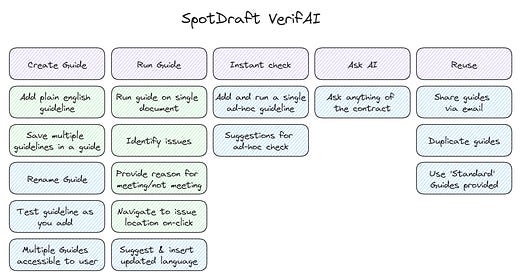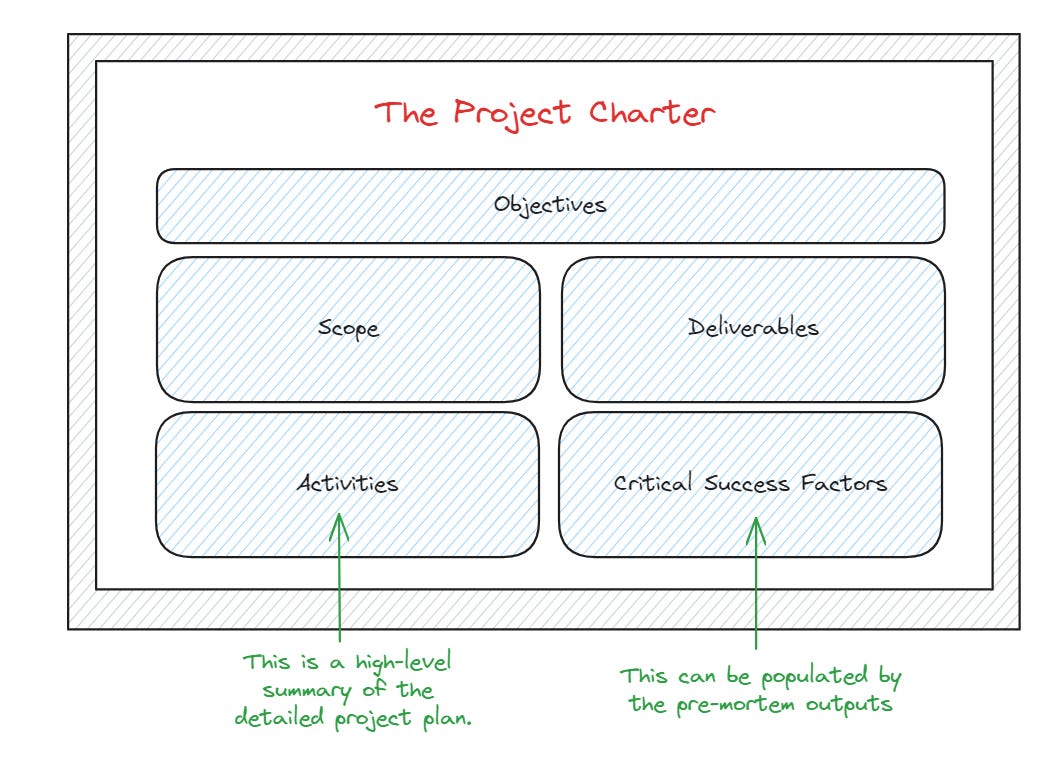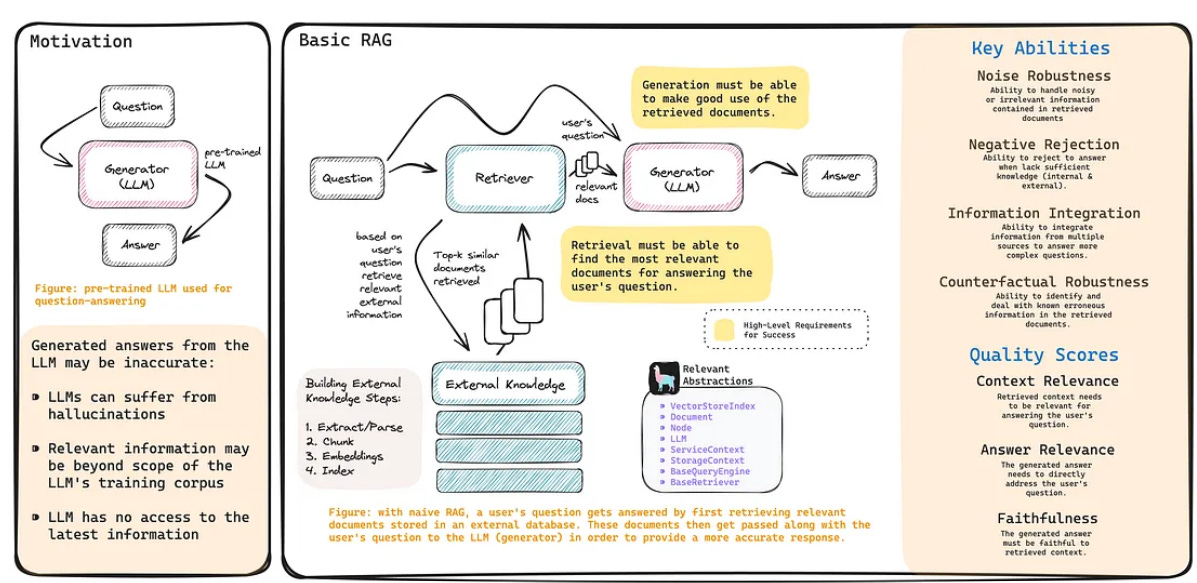Legal Tech Trends Newsletter: #23
Infinite interns, MS CoPilot, Project Charters, and GenAI releases
Happy Friday, and welcome to the 23rd edition of Legal Tech Trends!👋
A minor cold and major client commitments hit my hopes of keeping the fortnightly cadence so far this year, but I hope this edition is worth the wait.
I like to cover a healthy balance of content across legal tech, but most recent market developments of note have involved GenAI, so you can expect a heavy GenAI focus in this edition!
💡Food for Thought
I use GenAI daily and often spend hours on the weekend following my curiosity about GenAI-related topics, so I’m naturally excited about its potential in legal. But I also maintain a healthy dose of caution; remember, most tools demo extremely well, but creating enterprise-ready products is hard.
For traditional software delivery, we have unit, integration and regression testing. However, it’s harder to test and evaluate GenAI as the outputs are both probabilistic and more subjective. In the context of GenAI development, prompts are akin to code segments. We’re still in the early experimentation phase, where the market and a host of new companies are exploring how to best monitor and evaluate the performance of this ‘code’ in production. I suspect this will become a higher priority as the space matures and we enforce the enterprise software standards we expect of other enterprise tech in production.
On the topic of quality control, recent soundbites from three separate podcasts strike a chord when combined:
AI is like having infinite interns.
You don’t actually ship what the intern does. At least not without checking.
Directionally accurate in legal will get you fired.
GenAI is amazing, but we do operate in an industry where the tolerance for error is extremely low, and the potential impacts of error are extremely high.
Microsoft CoPilot
Many law firms and law departments have been eager to try out Microsoft CoPilot for months, but the initial requirement of purchasing a minimum of 300 licenses was a significant barrier. Microsoft recently dropped this minimum license requirement and also launched ‘CoPilot Pro’ for individual use.
For £19.00 per user/month, you now have the option to acquire it for personal use. I strongly suggest trying it out to form your own opinion about its capabilities. Even if you cancel after one month, it’s a cheap, hands-on GenAI education! LINK
Within the Microsoft suite, I use Powerpoint most frequently. AI interns are useful for many tasks, but for now, CoPilot’s Powerpoint skills are too basic for my needs.
I particularly liked the video case studies presented by the law firm CMS, showcasing their application of MS CoPilot. LINK
My Writing
✍️ Blueprint for Success: The Essential Project Charter Guide
There are many fantastic frameworks to support successful project delivery, but the simplicity and effectiveness of the Project Charter ensures it's amongst my favourites. In this post, originally published on the Legal Technology Hub, I outline my preferred approach to Project Charters and step through a simple example of a typical law firm innovation and legal technology review to bring it to life. LINK
AI News
💯 Am Law 100 Law Firms - Most Popular GenAI Use Cases
Am Law reached out to members of the Am Law 100 to examine how those firms were using GenAI. LINK, ORIGINAL SOURCE (Potential paywall)
Of the 41 firms that responded, the most common uses of are:
Summarizing documents/generating transcripts (15)
Legal research (11)
Drafting marketing materials/attorney bios (8)
Drafting legal material (7)
E-discovery (5)
🔍 TR launches ‘Ask Practical Law AI’ and ‘Clause Finder’ in the US
Both products will be sold as add-on subscriptions and available to non-US customers later in 2024. LINK
Ask Practical Law AI provides a chat interface that synthesizes a summary answer from Practical Law, including links to the sources.
Clause Finder is embedded in Microsoft Word and enables users to surface clauses from PL content, SEC documents, or a customer’s own internal documents. This ‘Smart Drafting/Clause Retrieval’ category of legal tech is expanding quickly and is similar to clause retrieval products like Henchman, Draftwise, Clausebase, and Law Insider’s Clause Finder.
🌟 Clearbrief Partners with LexisNexis, Enabling Access to Lexis Legal Content While Using Clearbrief in Word
The partnership provides Clearbrief customers who also have Lexis subscriptions with access to legal content and citations on Lexis while drafting documents within the Clearbrief add-in for Microsoft Word. LINK
✅ TermScout Launches ‘Screens’, a Marketplace for Lawyers to Build and Sell Contract Review AIs
Contract review appears to be one of the more promising and popular early use cases for GenAI, with several companies recently launching products enabling users to review contracts rapidly against a defined set of key checks. ARTICLE, DEMO
I like several aspects of TermScout’s approach:
Experts can easily create their own ‘Screens’ and sell them on the marketplace. This is a promising move in helping lawyers leverage their expertise to build digital products and deviate from the billable hour!
Experts keep 75% of the revenue, with TermScout taking 25%.
The website is beautifully designed!
This has some conceptual similarities to OpenAI’s GPT store:
Use natural language to create small AI-powered tools with pre-configured prompts.
Publish your tool to a public marketplace.
The public can easily access your pre-configured AI tool.
However, whilst the GPT store is the wild west of unverified tools, TermScout’s marketplace contains verified ‘Screens’ from experts.
💫Bonus: In the last edition (#22), I covered SpotDraft’s VerifAI contract review word plugin. Here is a quick and dirty breakdown of that product, with the green boxes highlighting some of the key features that also appear in ‘Screens’.
It’s important to note that this is not an extensive product comparison or feature breakdown of ‘Screens’, they are different product propositions, it’s just a quick exercise to visualise some interesting product similarities!
Raises & Round-up
💸 Gen AI contract drafting and review assistant Spellbook raises $20m
The word plugin helps users draft and review contracts using large language models from both OpenAI and Anthropic. They currently have a lengthy waiting list for access whilst already serving 1,700 law firms and legal teams. They also count Addleshaw Goddard as a customer. LINK
Sidenote: This is the only Legal Tech startup I’ve ever seen advertise on Instagram. I regularly see their ads, and friends that know I work in legal tech frequently send me screenhots of the ads in their feeds!
💵 Proof Raises $30M Series B
Proof provides a litigation services marketplace where law firms and government agencies can access a nationwide network of process servers, electronic court filing services, and remote notarization. LINK
Adjacent Interests
🎨AI-poisoning tool Nightshade is now available for artists to use LINK
🗣️AI voice startup ElevenLabs lands $80M round, launches marketplace of cloned voices LINK
⚡AI Using Too Much Energy, Will Require Breakthrough Energy Source LINK
🛠️ The Modern AI Stack: Design Principles for the Future of Enterprise AI Architectures LINK
🔍A Cheat Sheet and Some Recipes For Building Advanced RAG LINK
I love these sketches! ‘Basic RAG’ and ‘Advanced RAG’ are also helpful distinctions to highlight potential limitations and suggested improvement approaches.
That’s a wrap. To satisfy your curious legal tech mind before the next edition drops, explore LegalTechTrends.com for a searchable feed of legal tech news.
Thanks for reading. If you enjoyed it, please take a second to forward this email to a colleague who might also appreciate it.
Have a great Friday!
About me.
I’m the founder of Titans, a legal tech and innovation consultancy for leading law firms and new law companies.Legal Tech Trends is my fun outlet to share my hype-free positive take on legal tech market developments, informed by my own industry experiences and insights.
Connect with me on LinkedIn for more Legal Tech and innovation content Here 👋







